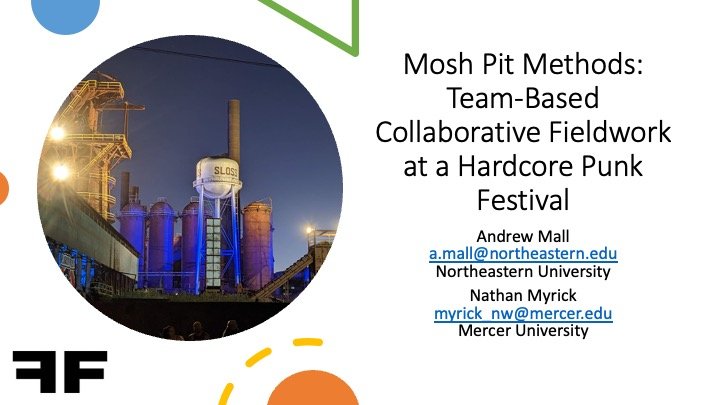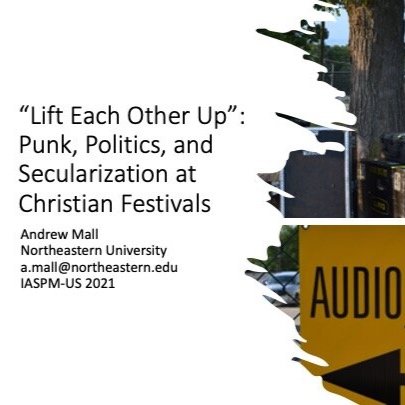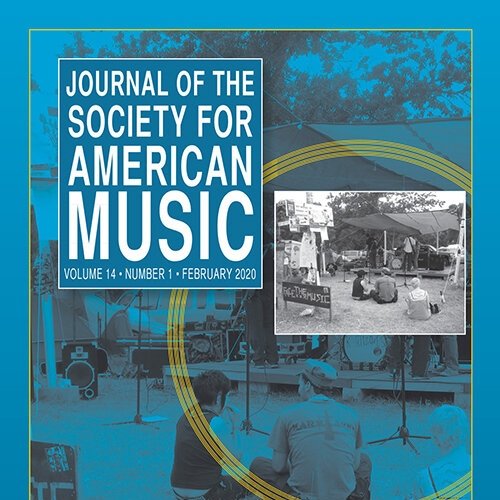
Hardcore Community at Furnace Fest: Nostalgia, Belongingness, and Vulnerability
Punk Scholars Network conference presentation (2025). In this paper I reflect on the meaningfulness of the Furnace Fest community to individual participants. My findings are based on four sequential years of fieldwork at Furnace Fest (2021–24) with ever-growing research teams, hundreds of survey responses, and dozens of hours of semi-structured interviews with organizers, community members, and random attendees (around 50 conducted at the 2024 event alone). I argue that nostalgia at Furnace Fest is generative as much as it is reflective, affirming participants’ identities while also empowering them to take risks and be vulnerably transparent in relative safety.
Could Fyre Festival happen again? Billy McFarland thinks so, but experts have their doubts
Northeastern Global News (2024). The disgraced founder behind the original Fyre Festival is out of prison and announced his plans to run a second iteration of the failed music festival in April 2025. His intentions to bring back the festival, which led to him doing jail time for wire fraud charges, was shocking to people in the music world.
Music Festival Chaos: Inside the Deadly Risks at Concerts
Newsweek (2024). Music festivals like AstroWorld, Route 91 in Las Vegas, and Woodstock '99 have turned from parties to tragedies over the years, raising serious concerns about safety and security. These deadly stampedes, shootings, and riots, leave festival goers continuing to question if there are enough safety measures in place to protect attendees.
How can you stay safe during a music festival?
Northeastern Global News (2024). Safety has always been an issue when it comes to music performances, according to Andrew Mall, an associate music professor at Northeastern University. Whether it be an outdoor concert, a traveling event like Lilith Fair in the ’90s, or the destination festivals of today, organizers have had to contend with issues like crowd crush, equipment collapse, fires, interpersonal violence and shootings.
Hardcore Community at Furnace Fest
IASPM-US conference panel (2024). In 2023, our six-member team was on site in Birmingham, Alabama for five days, building upon over two years of prior research in 2021 and 2022. In this panel, four fieldwork team members share their findings along distinct themes. Together, we explore the ways in which community is substantiated and maintained at Furnace Fest.

Hardcore Nostalgia at Furnace Fest
MEIEA conference presentation (2024). What is the nature of hardcore, and how does hardcore nostalgia reflect its values and meet its needs? More than merely a marketing ploy, is hardcore nostalgia also an invitation to revisit and romanticize the anxieties of our youth; an attempt at a do-over; or perhaps even an act of emotional and mental self-care? In this presentation, we trace these trends in hardcore and emo to ask: what do we do with nostalgia that asks us to remember when we were young and angry and sad?
How this class is preparing students for the world of music festivals
Northeastern Global News Magazine (2023). Want to try your hand at a designing a music festival or learn about the history of these events? These Northeastern experiential learning courses help create the next generation of festival organizers.

Mosh Pit Methods: Team-based Collaborative Fieldwork at a Hardcore Punk Festival
SEM conference presentation (2023). In this paper, we address the complexities of collaborating at these multiple levels: with each other, research assistants, festival organizers and staff, community leaders and members, and festival attendees. In attending to these challenges and opportunities, we open a conversation about the power and potential of team-based, collaborative fieldwork.

Collaborative Ethnography at Furnace Fest: Initial Findings on Affect, Community, and Commerce in Hardcore
Colloquium presentation (2022). At Furnace Fest (Birmingham, Alabama), attendees travel from across the U.S. and Canada for three days of emo, hardcore, metal, and punk performances. Based on ongoing fieldwork, in this talk I consider what my research collaborators and I have learned so far about working together—both in terms of our research methodologies and in terms of festival organizers and their communities.

Furnace Fest Community: A Public Conversation
Public research presentation (2022). Prior to Furnace Fest 2022, I helped organize a public conversation as part of an official pre-fest event. The plan was to present some of our initial research findings and moderate a public conversation with the participation of two of Furnace Fest’s organizers and one of the Furnace Fest Community moderators.

(Post-)Christian Hardcore, Community, and Nostalgia at Furnace Fest
Conference presentation (2022). At Furnace Fest 2021 (Birmingham, Alabama), attendees traveled from across the U.S. and Canada for three days of emo, hardcore, and metal performances. Based on ongoing, collaborative fieldwork in the Furnace Fest community, in this paper I build upon prior work that posits festivals as physical places for imagined communities (Mall 2015; cf. Anderson 1991 [1983]) and scenes (Mall 2020) to consider how music festivals, as sensational forms (Meyer 2009), substantiate musical community itself (see, e.g., Shelemay 2011).

Musicking the Right Way: Performing Ethics and/as Aesthetics at Christian Music Festivals
AMS conference presentation (2021). Cornerstone Festival performed its organizers’ ethics into being, witnessed in its do-it-yourself scrappiness, its (at times) overwhelming sonic chaos, its sanctioned attendee-operated “generator stages,” and its willingness to engage difficult theological questions. From one perspective, this reflects a tautological relationship between orthodoxy and orthopraxy grounded in theology; another perspective reveals the co-constitutiveness of ethics and aesthetics grounded in practice. To recast Jeffers Engelhardt’s “right singing,” at Cornerstone, if the performing was right, then the ethics expressed in that performing were right, and if the ethics were right, then the musical practices grounded in those ethics were right. In this paper, I draw on theories of music and ethics rooted in Christian musicking to generate a theoretical framework that situates these practices not within a shared faith but rather within a shared ethical framework irrespective of religious belief.

Vinyl Revival
Journal of Popular Music Studies (2021). At the turn of the twenty-first century, vinyl records had remained a steady if unsubstantial component of recorded music revenue in the United States. But sales of physical media started declining steadily in 2001 in a seemingly unstoppable slide the RIAA attributed to digital piracy. Then a funny thing happened: although CD sales continued to shrink, by the end of the decade vinyl record sales had started growing, reaching $88.9 million in 2010—a revenue level not seen in two decades. In this article I trace these trajectories in more detail, considering how the trajectory of vinyl record sales in the twenty-first century both confirm and frustrate concepts of revival.

“Beer & Hymns” and Community: Religious Identity and Participatory Sing-alongs
Yale Journal of Music and Religion (2021). As a series of loosely-organized events, “Beer & Hymns” started at the Greenbelt Festival in England in 2006 and migrated to the Wild Goose Festival in North Carolina in 2012. Local Beer & Hymns gatherings meet at bars, breweries, clubs, and pubs across the U.K., the U.S., and around the world. In this article, I analyze the sonic and social fabric of Beer & Hymns as a participatory space that promotes community, contextualized against white U.S. evangelicalism’s contested relationship with the secular.

“Lift Each Other Up”: Punk, Politics, and Secularization at Christian Festivals
IASPM-US conference presentation (2021). When the members of Flatfoot 56, a Celtic punk band from Chicago, speak of “brotherhood” at AudioFeed, a Christian music festival, they refer to congregational cohesion; at a secular punk venue, however, scene unity is just as likely an interpretation. Whereas Christian punks sacralize secular places, such as the bars and nightclubs where they often perform, this paper suggests that bands like Flatfoot 56 might be thought to secularize sacred places (i.e., Christian festivals) by decentering U.S. evangelicalism’s most controversial public positions. Through an ethnographic analysis of Flatfoot 56 performances, considering what is sung/spoken aloud and what is not, this paper argues for a nuanced, mediating perspective that recognizes an ambivalence about identity politics among many evangelical subculturalists moving between secular and sacred spaces.

Music Business, Ethics, and Christian Festivals: Progressive Christianity at Wild Goose Festival
Ethics and Christian Musicking, Routledge (2021). In this chapter, I consider the ways in which the business of music complicates the ethics and objectives of Christian music. I address some of the effects of yoking Christian music to the for-profit imperatives of entertainment conglomerates, but I quickly turn my attention to Christian festivals, which are unique places in which competing ethics find an equilibrium, albeit one that is always temporary and often uneasy.

Music / Business / Ethics at Christian Festivals
Music Festival Studies conference presentation (2020). In this paper, based on ethnographic fieldwork at Christian music festivals and formal interviews with festival organizers, I address festivals as sites of musical ethics made manifest. By focusing on specific niche Christian music festivals, I am able to emphasize the relationships between the values of their organizers, artists, and attendees and the lived experiences of the events themselves. But my conclusions have implications for the viability of the broader festival industry, particularly small events that cannot afford to compete with the Bonnaroos, Coachellas, and Lollapaloozas.

Music Festivals, Ephemeral Places, and Scenes: Interdependence at Cornerstone Festival
Journal of the Society for American Music (2020). Cornerstone was an annual four-day-long Christian rock festival in Illinois that ran from 1984 until 2012, first in Chicago’s northern suburbs and then on a former farm in the rural western part of the state. This article examines the production of space and place at Cornerstone. In doing so, it contributes a vital link between scene theory and the growing ethnomusicological literature on festivals.

Introduction: Festivals and Musical Life
Journal of the Society for American Music (2020). In this special issue of JSAM, my overarching goal has been to showcase the rich diversity of festival research, decentering popular music studies from it, and in doing so to demonstrate both that music scholars working in a variety of areas have much to contribute to contemporary popular and academic discourse on music festivals, and that festival studies has much to contribute to music scholarship beyond popular music studies. The articles collected here contribute to a broad interdisciplinary literature on music festivals. Each also illustrates the value of music festival research to the scholarship of music in the Americas.

“Lift Each Other Up”: Punk, Politics, and Secularization at Christian Festivals
Christian Punk, Bloomsbury (2020). This chapter focuses on the Chicago-based Christian Celtic-punk band Flatfoot 56, analyzing their performances in secular venues and at the Christian music festivals Cornerstone and AudioFeed. Arguing that Christianity and punk are inseparable to the band’s identity, the chapter analyzes their approach to religious communication in songs and from the stage. The chapter also addresses the evolution of Christian music festivals and the tensions around youth-focused niche forms of Christian music, such as punk.
Search and navigate extras
- music industries
- festivals
- gamelan
- Boston
- God Rock Inc
- CCM
- Northeastern University
- Christian rock
- panels
- Tufts University
- worship
- congregational music
- Northeastern Global News
- SCM
- record labels
- Nashville
- methods
- ethics
- Chicago
- University of Chicago
- punk
- SEM
- radio
- Taylor Swift
- subculture
- capital
- Furnace Fest
- AMS
- TikTok
- IASPM-US
- hardcore
- sing-alongs
- Amy Grant
- crossover
- introductions
- emo
- vinyl
- TIME
- scene
- AAR
- Beer & Hymns
- MEIEA
- Christianity Today
- DePaul University
- Universal Music Group
- awards
- Future of Pop
- community
- Keith Green
- Ticketmaster